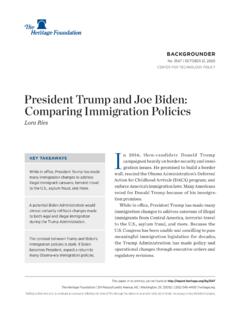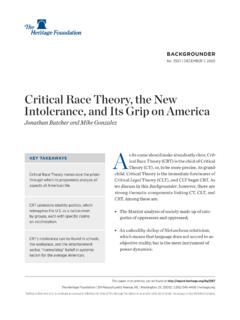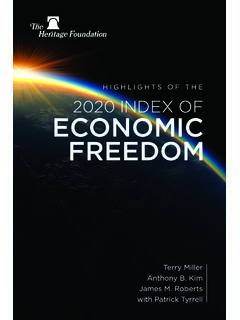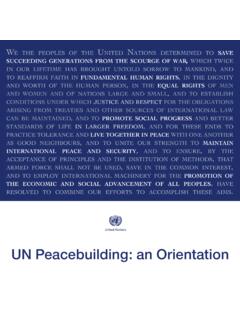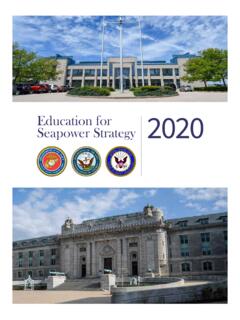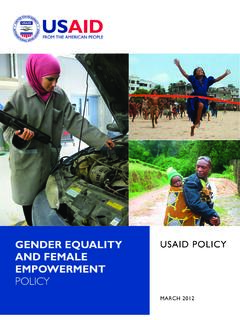Transcription of What Is National Security? - The Heritage Foundation
1 17 THE Heritage Foundation What Is National Security? Kim R. Holmes, PhDThe challenge in devising a reliable measure of military power is that the effort must be rooted in a concrete understanding of what National security is and what it is not. This essay examines the elements of National security , provid-ing both definitions of terms and a clarification of related concepts. It concludes with a number of take-aways from this analysis to help guide the making of a National security Short History of National SecurityModern concepts of National security arose in the 17th century during the Thirty Years War in Europe and the Civil War in England.
2 In 1648, the peace of Westphalia established the idea that the nation-state had sovereign control not only of domestic affairs such as religion, but also of external idea of the nation-state is commonplace today, yet it would be wrong to assume that it is the only way to look at international security . The pre-Westphalia international system was based on the assumption that there existed a universal principle governing the affairs of states led by emperors, popes, kings, and princes. That was indeed the principle of the Holy Roman Empire. The new idea of the nation-state took a different approach. peace and stability could be better served if people were not slaughter-ing each other over some universal principle in that case, religion.
3 It would be far better to have an inter- National system based on the equilibrium of nation-states dedicated to the limited purposes of National sovereignty and idea was challenged by the philosopher Immanuel Kant (1724 1804), who resurrected the universal principle idea not in the old religious context, but in a secular one inspired by the Enlightenment. In his 1795 essay Perpetual peace : A Philosophical Sketch, he outlined his idea that the system of nation-states should be replaced by a new enlightened world order. Nation-states should subordinate their National interests to the common good and be ruled by inter- National was born the secular view of supranational institutions governing international affairs, which today is reflected in the global worldview of liberal internationalism and most clearly manifested in the United is important to keep these two schools of thought in mind when considering the various defi-nitions of National security .
4 They are present in cur-rent debates over National sovereignty, internation-al law, and the role of international institutions in world affairs. American liberal internationalists for example, with their dedication to the United Nations and international governance, are neo-Kantians, whereas realists tend more to the views of Thomas Hobbes (1588 1679), Hugo Grotius (1583 1645), and other philosophers who espoused the supremacy of the Basic DefinitionsBefore analyzing different definitions of National security , it is important to understand some of the concepts the term INDEX OF MILITARY STRENGTH The first is the concept of power. It can best be defined as a nation s possession of control of its sovereignty and destiny.
5 It implies some degree of control of the extent to which outside forces can harm the country. Hard, or largely military, power is about control, while soft power is mainly about influence trying to persuade others, using methods short of war, to do of power exist along a spectrum, from using force on one end to diplomatic means of persuasion on the other. Such instruments include the armed forces; law enforcement and intelligence agencies; and various governmental agencies dedi-cated to bilateral and public diplomacy, foreign aid, and international financial controls. Variables of power include military strength, economic capac-ity, the will of the government and people to use power, and the degree to which legitimacy either in the eyes of the people or in the eyes of other nations or international organizations affects how power is wielded.
6 The measure of power depends not only on hard facts, but also on perceptions of will and term to understand properly is military strength. This term refers to military capacity and the capabilities of the armed forces, and it is a capac-ity that may not actually be used. It often is under-stood as a static measure of the power of a country, but in reality, military strength is a variable that is subject to all sorts of factors, including the relative strength of opponents, the degree to which it is used effectively, or whether it is even used at is the use of a military or law enforcement capacity to achieve some objective.
7 It is the actu-al use of strength and should not be equated with either strength or power per se. Using force unwise-ly or unsuccessfully can diminish one s power and strength. By the same token, using it effectively can enhance power. Force is an instrument of power just as a tool or some other device would be, but unlike institutional instruments like the armed forces, its use in action is what distinguishes it from static instruments of strength like military capacity. Thus, force should be understood narrowly as an applied instrument of , there is National defense. Strictly speaking, this refers to the ability of the armed forces to defend the sovereignty of the nation and the lives of its peo-ple.
8 However, since the attacks of September 11, 2001, the mission of homeland security using domestic as well as military instruments to defend the nation from terrorist and other attacks either inside or out-side the country has come to be understood as an element of National Systems of SecurityUnderstanding the major schools of thought on international security that have arisen since the end of World War II will also help to explain the international context in which American National security is expected to operate. These schools of thought include: lCollective Defense. Collective defense is an offi-cial arrangement among nation-states to offer some defense support to other member states if they are attacked.
9 It is the basis of the classic defense alliances like the Triple Entente among the United Kingdom, the French Third Repub-lic, and the Russian Empire before World War I and the North Atlantic Treaty Organization today. It is distinguished not only by geographi-cal limitation, but also by its focus on mili-tary commitments. lCollective security . Collective security refers to various types of arrangements. Strictly speak-ing, collective defense involving mutual commit-ments of member states could be considered a form of collective security , albeit one limited geo-graphically to military defense. More often, how-ever, collective security is thought of as a regional and global concept represented by such interna-tional institutions as the League of Nations and the United Nations.
10 Often, such arrangements are buttressed by concepts of international law and international aid and governance. Their dis-tinguishing characteristic is their hybrid charac-ter between collective action at the international level and the acceptance of nation-states being ultimately responsible for their own security . lGlobal security . Global security is a set of ideas, developed largely by the United Nations since the end of the Cold War, that the world s security is everybody s business. It rests on the premise that no single nation is secure unless all are secure. While lip service is given to the idea of National defense, the far greater focus is on attempting to eliminate conflict through international law, aid, confidence-building measures, and global gover-19 THE Heritage Foundation nance.
